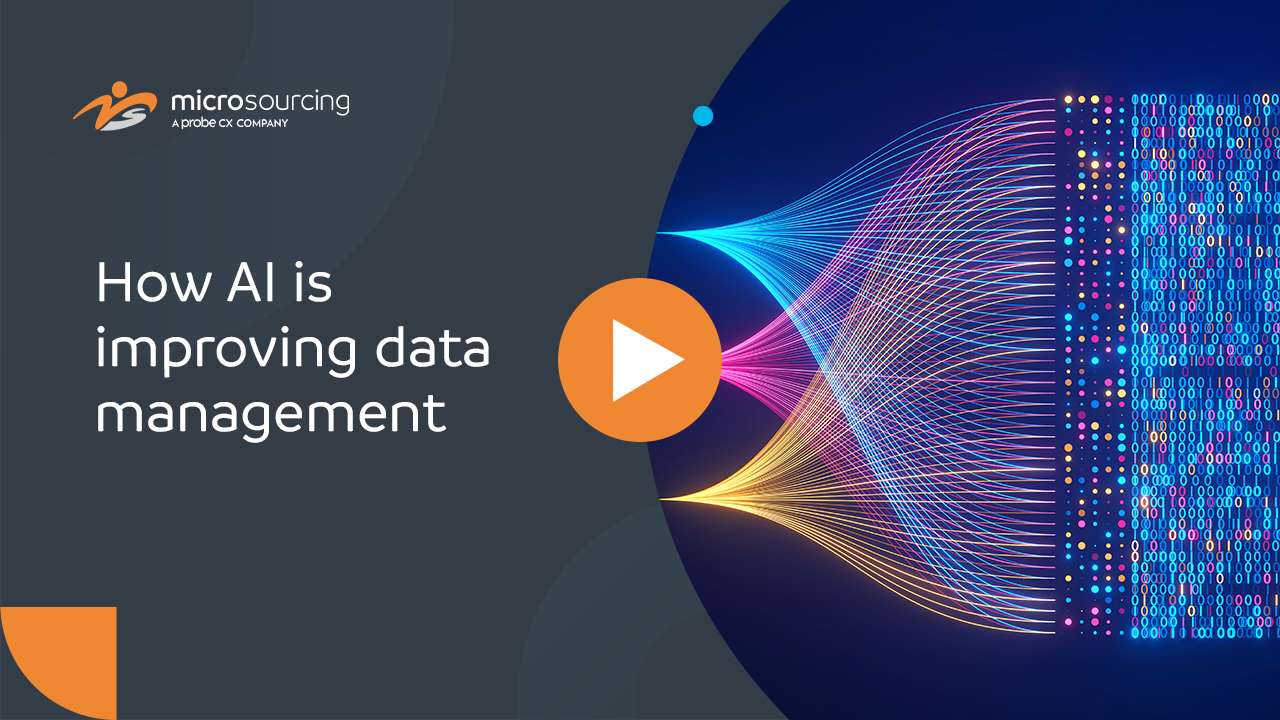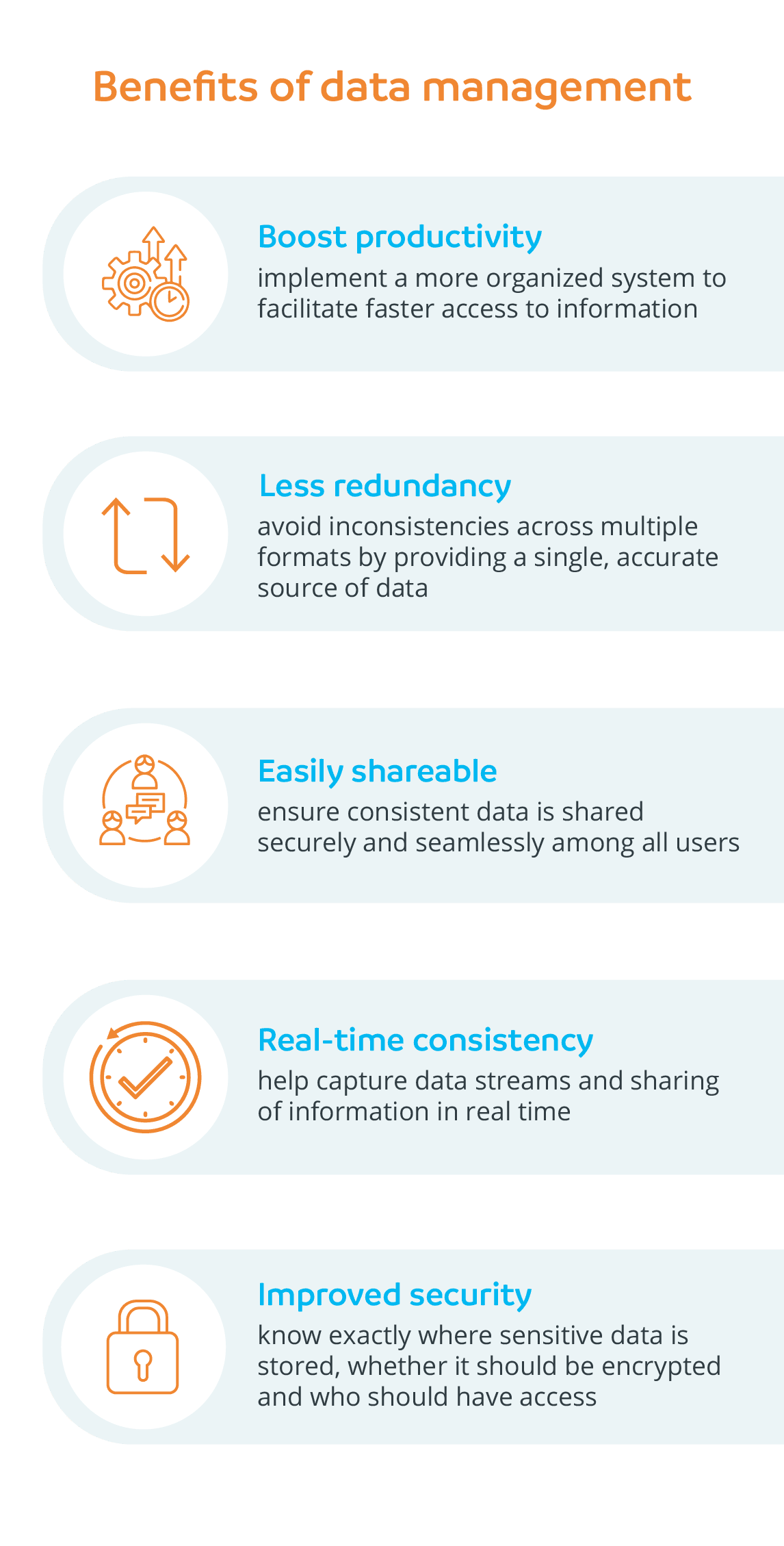How AI is improving data management
In late 2020, data strategy expert Deryck B released the first article in a three-part series on the future of data analytics1. Before looking to the horizon though, the self-styled “data practitioner” glanced over his shoulder and reflected on where we have come from.

As Deryck saw it, humans have been analyzing data since the birth of civilization, pointing to clay tablets from ancient Iraq that show lists of people employed by a state that recognized the value of gathering, analyzing and preserving such information. He then took readers through the invention of papyrus, paper journals and computers, which changed the data game forever.
Finally, he arrived at the current day where data management is not just big business but an industry of its own. Studies have revealed 90% of the world’s data has been created in the past two years alone2, with the global data analytics market expected to reach more than $300 billion by 20303. The growth is simply jaw-dropping and, as Deryck noted, it means everyone can now benefit from data.
“(It) has simply gone through a series of innovations and transformations during its long life,” he wrote. “But what is new is that data has moved from the province of a small elite to being a mass-market concept.”
While that transformation has been a boon for organizations of all shapes and sizes, an unintended consequence is that managing such huge reams of data is becoming a challenge for many businesses. Having previously relied on select staff or small teams to oversee their data management needs, they find themselves struggling to process material they already possess, let alone keep pace with the influx of new facts and figures coming their way.

Fortunately, cutting-edge technology is not only playing a role in facilitating fresh data but also with how it is managed. We speak, of course, of artificial intelligence, which is proving to be a lifeboat for businesses drowning in a sea of data.

What is AI in data management?
AI in data management is the practice of using artificial intelligence to help with collecting, keeping and using data securely, efficiently and cost-effectively. By helping optimize the use of information, data management allows organizations to make decisions and take actions that prove beneficial in the short- and long-term. Incorporating AI into this process helps automate compilation of such data, improves accuracy, reduces costs and allows team members to focus on more valuable and insightful aspects of data management.
How can AI help data management?
Tech publication VentureBeat recently described data as “the new oil” but in the next breath made a critical point. “Raw data is no good in and of itself,” it stated4. “Like oil, data assets have to be gathered entirely and accurately and sent through different refining processes to create value for end users.”
And it is there – in the general data lifecycle – that AI is proving a game-changer for businesses by supporting their data management needs in various ways.
- Data integration: one of the greatest challenges when it comes to data is bringing together so much information from so many different sources, formats and systems into one unified view. AI is easing that load by automatically identifying and combining data from diverse databases to provide users with consistent access and delivery. Faster and more accurate – what’s not to like about that?
.png?width=687&height=727&name=Global%20enterprise%20data%20management%20market%20(1).png)
- Data classification: already a broad area, data classification is growing larger still as more material and media assets are digitized. Little wonder that businesses are relishing the chance to use AI to automatically classify and categorize data based on its content, context or other attributes, with subsequent meaningful groupings making it easier to retrieve and analyze.
- Data cleaning: dirty data is the bane of the analytics industry for a simple reason – poor data equals poor insights. To ensure staff can spend more time analyzing datasets rather than cleaning them, AI algorithms are increasingly being used to identify and delete wrong, corrupted, duplicated or incomplete information. There are fewer easier ways to save time and, in turn, money.
- Data security: no article about data is complete without a nod to security and the fear of sensitive information ending up in the wrong hands. AI-powered solutions can enhance data management by analyzing access patterns, detecting anomalies and even raising alerts for potential security breaches. It can also anonymize or pseudonymize sensitive data to ensure privacy compliance.
- Predictive analytics: quality data scientists are worth their weight in gold but even they cannot match AI’s ability to uncover patterns, trends and insights in large datasets. Better still, AI models can be used to forecast future trends based on such findings and other historical data to help business leaders make data-driven decisions for a more profitable future.
Summary
Befitting a technology unlike anything the world has seen, this is just the beginning for artificial intelligence in the data management field. It is evolving at warp speed and that is why organizations cannot afford to be complacent in embracing its benefits today and staying abreast of the next-generation solutions continually rolling off the production line.
Studies show that data-driven companies are 58% more likely to surpass revenue targets than those that do not prioritize data5. Discover the five top data management software solutions and why more businesses are turning to outsourcing providers to support their needs.
Reference:
[1] (23) A brief, brief history of Data Analytics | LinkedIn
[2] The Most Surprising Data Management Industry Statistics in 2023 • GITNUX
[3] The Global Data Analytics Market size is expected to reach $301.8 billion by 2030, rising at a market growth of 26.8% CAGR during the forecast period (yahoo.com)
[4] How AI can ease those data management woes | VentureBeat
[5] Uncovering the Hidden Insights of Data Management Statistics 2023 • GITNUX
Popular posts
Browse by topic
- Accounting
- Accounting & Finance
- All Industries
- Banking
- BPO/RPO/HRO
- Communication
- CSR & ESG
- Customer & Client Acquisition
- Customer Experience
- Cybersecurity
- Cybersecurity & Compliance
- Data Management
- Digital Operations
- Digital Transformation
- eCommerce
- Education
- Employee Engagement
- Engineering & Construction
- Financial Services
- Healthcare
- Hospitality and tourism
- HR & Recruitment
- Information Technology
- Insurance
- Legal Services
- Logistics
- Offshoring & Outsourcing
- Outsourcing
- Professional Services
- Real Estate
- Retail & eCommerce
- Startups
- Talent Acquisition and Retention
- Technology
- Trends & Guides
- Workforce Integration
Sign up for the offshoring eCourse
12 in-depth and educational modules delivered via email – for free
Related Posts
AI customer support: benefits, challenges and best practices
The evolution of customer support has been a sight to behold. From the birth of postal systems that allowed businesses to engage with customers in a..
The future of customer service: why 24/7 support is non-negotiable
Imagine trying to resolve an issue with a product or service late at night, only to find the company's customer service is closed. Waiting hours for..
From reactive to proactive: using offshore teams to anticipate customer needs
By 2025, Gartner predicts that proactive interactions will outnumber reactive ones1. Gone are the days when customers would just wait for problems to..
